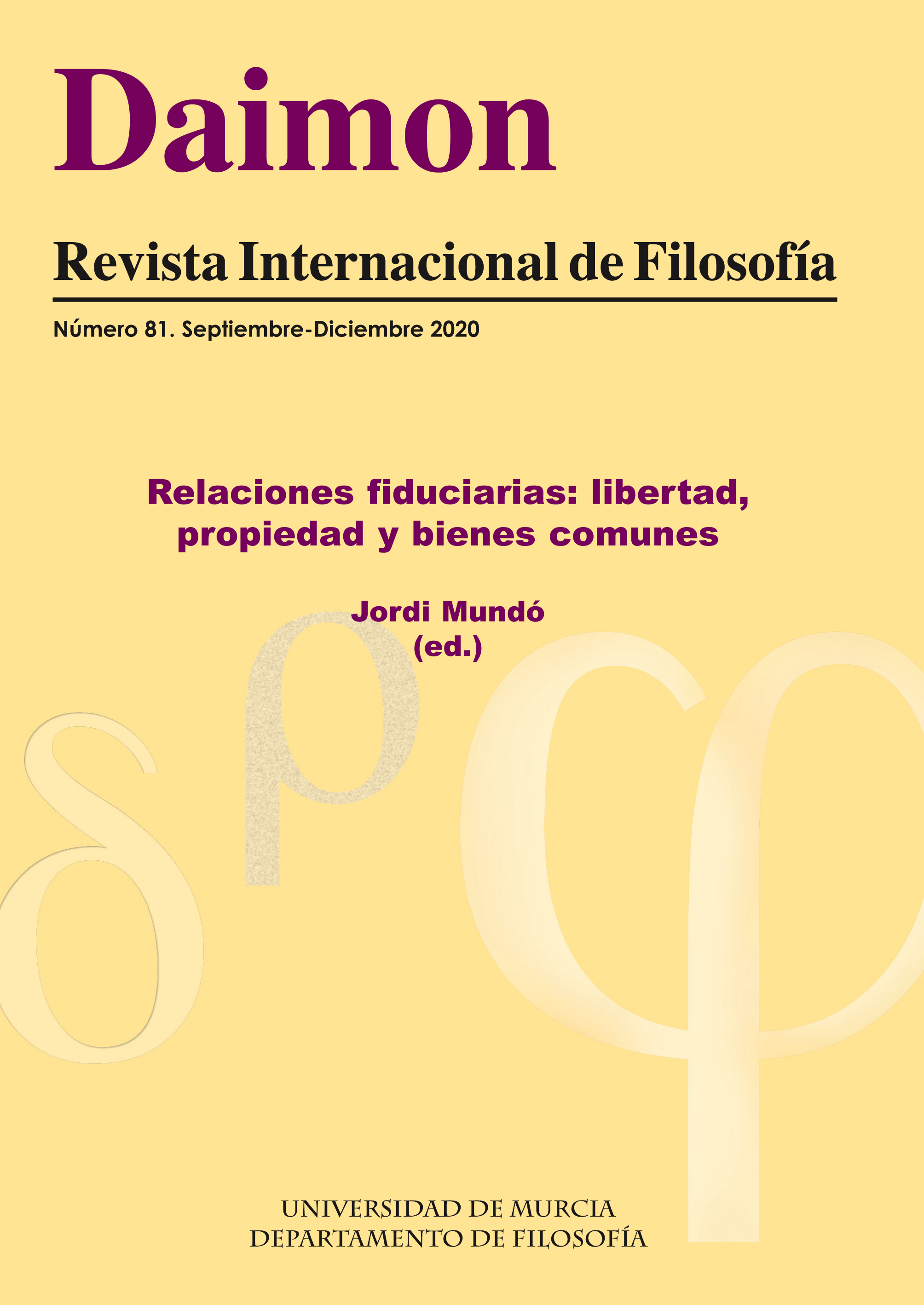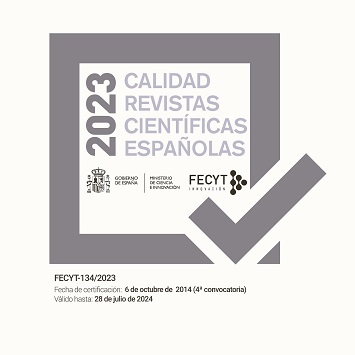Democracia republicana y autoridad política fiduciaria
Abstract
In this article I propose a justification of democracy, and of the political authority derived from it, based on the republican ideal of freedom as non-domination. I argue that democratic procedures have value in themselves because they are decision-making mechanisms where there is freedom on a reciprocal basis. I then show that political authority must be adequately controlled in order to avoid the existence of domination. This is why it must be conceived as a fiduciary relationship, in which the rulers act as agents of the citizenry. Finally, I establish the need for rulers to comply with fiduciary duties and for citizens to develop civic virtues.
Downloads
References
Anderson, E. (2009), «Democracy: Instrumental vs. Non-Instrumental Value», en: T. Chris- tiano y J. Christman (eds.): Contemporary Debates in Political Philosophy, Malden: Blackwell Publishing, pp. 213-228.
Bellamy, R. (2013), «Rights, Republicanism and Democracy», en: A. Niederberger y P. Schink (eds.): Republican Democracy. Liberty, Law and Politics, Edinburgh: Edinburgh University Press, pp. 262-285.
Bertomeu, M. J. y Domènech, A. (2005), «El republicanismo y la crisis del rawlsismo metodológico (Nota sobre método y sustancia normativa en el debate republicano)», Isegoría, 33, pp. 51-75.
Bovens, M., Goodin, R. y Schillemans, T. (2014), «Public Accountability», en: M. Bovens, T. Schillemans y R. Goodin (eds.): The Oxford handbook of public accountability, Oxford: Oxford University Press, pp. 182-208.
Bowles, S. (2016), The Moral Economy. Why incentives are not substitutes for good citizens, Londres: Yale University Press.
Bowles, S. y Gintis, H. (2000), «Reciprocity, Self-Interest, and the Welfare State», Nordic Journal of Political Economy, 26, pp. 33-53.
Casassas, D. y de Wispelare, J. (2016), «Republicanism and the political economy of demo- cracy», European Journal of Social Theory, 19 (2), pp. 283-300.
Christiano, T. (2004), «The Authority of Democracy», The Journal of Political Philosophy, 12 (3), pp. 266-290.
Christiano, T. (2018), «Democracy», Stanford Encyclopedia of Philosophy. https://plato. stanford.edu/archives/fall2018/entries/democracy/.
Criddle, E. J. (2017), «Liberty in loyalty: A republican theory of fiduciary law», Texas Law Review, 95 (5), pp. 993-1060.
De Francisco, A. (2003), «Para forzar a los gobiernos a responder», en: M. J. Bertomeu, A. Domènech, y A. De Francisco (eds.): Republicanismo y democracia, Madrid: Miño y Dávila, pp. 69-90.
Domènech, A. (1993), «... y fraternidad», Isegoría, 17, pp. 49-77.
Domènech, A. (2002), «Individuo, comunidad y ciudadanía», en: J. Rubio, J. M. Rosales y M. Toscano (eds.): Retos pendientes en ética y política, Madrid: Trotta, pp. 27-42. Domènech, A. (2019), El eclipse de la fraternidad. Una revisión republicana de la tradición socialista, Madrid: Akal.
Elster, J. (2007), «El mercado y el foro: tres formas de teoría política», Cuaderno Gris, 9, pp. 103-126.
Fox-Decent, E. (2005), «The Fiduciary Nature of State Legal Authority», Queen’s Law Journal, 31, pp. 259-310.
Fung, A. (2003), «Survey article: Recipes for public spheres: Eight institutional design choices and their consequences», Journal of Political Philosophy, 11 (3), pp. 338-367.
González-Ricoy, I. y Queralt, J. (2018), «Political liberties and social equality», Law and Philosophy, 37 (6), pp. 613-638.
Kolodny, N. (2014), «Rule Over None II : Social Equality and the Justification of Democracy», Philosophy and Public Affairs, 42 (4), pp. 195-229.
Laín, B. (2020), «Del derecho natural al pacto fiduciario: gobierno y propiedad en la economía política republicana», Isegoría, 62, pp. 9-34.
Lovett, F. (2010), A General Theory of Domination and Justice, Oxford: Oxford University Press.
Lovett, F. (2019), «Republicanism and Democracy Revisited», en: Y. Elazar y Ge. Rousselière (eds.): Republicanism and the Future of Democracy, Cambridge: Cambridge University Press, pp. 117-129.
MacGilvray, E. (2011), The Invention of Market Freedom, Cambridge: Cambridge University Press.
Martí, J. L. (2006), La república deliberativa, Barcelona: Marcial Pons.
McCammon, C. (2015), «Domination : A Rethinking *», Ethics, 125 (4), pp. 1028-1052.
McCormick, J. P. (2019), «The New Ochlophobia?», en: Y. Elazar y Ge. Rousselière (eds.): Republicanism and the Future of Democracy, Cambridge: Cambridge University Press, pp. 130-151.
Mundó, J. (2017), «La constitución fiduciaria de la libertad política. (Por qué son importantes las coyunturas interpretativas en la filosofía política )», Isegoría, 57, pp. 39-60.
Peña, J. (2005), «Ciudadanía republicana y virtud cívica», en: M. J. Bertomeu, A. Domè- nech, y A. De Francisco (eds.): Republicanismo y democracia, Madrid: Miño y Dávila, pp. 231-256.
Pettit, P. (1997), Republicanism. A Theory of Freedom and Government, Oxford: Oxford University Press.
Pettit, P. (2012), On the people’s terms. A Republican Theory and Model of Democracy, Cambridge: Cambridge University Press.
Pettit, P. (2019), «The General Will, the Common Good, and a Democracy of Standards», en: Y. Elazar y Ge. Rousselière (eds.): Republicanism and the Future of Democracy, Cambridge: Cambridge University Press, pp. 13-40.
Ponet, D. L. y Leib, E. J. (2011), «Fiduciary’s Law’s Lessons for Deliberative Democracy», Boston University Law Review, 91 (3), pp. 1249-1261.
Przeworski, A. (1999), «A Minimalist Conception of Democracy», en: I. Shapiro y C. Hacker-Cordón (eds.): Democracy’s Value, Cambridge: Cambridge University Press. pp. 23-55.
Przeworski, A., Stokes S. C. y Manin, B. (eds.) (1999), Democracy, Accountability and Representation, Cambridge: Cambridge University Press.
Rawls, J. (2002), Justicia como equidad. Una reformulación, Barcelona: Paidós.
Richardson, H. S. (2002), Democratic Autonomy. Public Reasoning about the Ends of Policy, Oxford: Oxford University Press.
Rostbøll, C. F. (2015), «Non-domination and democratic legitimacy», Critical Review of International Social and Political Philosophy, 18 (4), pp. 424-439.
Sen, A. (2014), La idea de la justicia, Madrid: Taurus.
Simmons, J. A. (2012), «Authority», en: D. Estlund (ed.): Oxford Handbook of Political Philosophy, eOxford: Oxford University Press.
Skinner, Q. (1998), Liberty Before Liberalism, Cambridge: Cambridge University Press. Tena, J. (2010), «Hacia una definición de la virtud cívica», Convergencia, 17 (53), pp. 311-337.
Tugendhat, E. (2008), Antropología en vez de metafísica, Barcelona: Gesdisa Editorial. Urbinati, N. (2012), «Competing for liberty: The republican critique of democracy», American Political Science Review, 106 (3), pp. 607-621.
Van Parijs, P. (1996), «Justice and Democracy: Are they Incompatible?», The Journal of Political Philosophy, 4 (2), pp. 101-117.
Viehoff, D. (2014), «Democratic Equality and Political Authority», Philosophy and Public Affairs, 42 (4), pp. 337-375.
Viehoff, D. (2017), «The truth in political instrumentalism», Proceedings of the Aristotelian Society, 117 (3), pp. 273-295.
Viehoff, D. (2019), «Power and Equality», Oxford Studies in Political Philosophy Volume 5 (September), pp. 1-37.
White, S. (2011), «The republican critique of capitalism», Critical Review of International Social and Political Philosophy, 14 (5), pp. 561-579.
Wood, E. M. (2012), Liberty and Property, Londres: Verso Books.
Las obras que se publican en esta revista están sujetas a los siguientes términos:
1. El Servicio de Publicaciones de la Universidad de Murcia (la editorial) conserva los derechos patrimoniales (copyright) de las obras publicadas, y favorece y permite la reutilización de las mismas bajo la licencia de uso indicada en el punto 2.
2. Las obras se publican en la edición electrónica de la revista bajo una licencia Creative Commons Reconocimiento-NoComercial-SinObraDerivada 3.0 España (texto legal). Se pueden copiar, usar, difundir, transmitir y exponer públicamente, siempre que: i) se cite la autoría y la fuente original de su publicación (revista, editorial y URL de la obra); ii) no se usen para fines comerciales; iii) se mencione la existencia y especificaciones de esta licencia de uso.
3. Condiciones de auto-archivo. Se permite y se anima a los autores a difundir electrónicamente las versiones pre-print (versión antes de ser evaluada) y/o post-print (versión evaluada y aceptada para su publicación) de sus obras antes de su publicación, ya que favorece su circulación y difusión más temprana y con ello un posible aumento en su citación y alcance entre la comunidad académica. Color RoMEO: verde.













